BY DEFENCE JOURNALIST SAHIL | T.I.N. NETWORK
“Vande Mataram” Resonates Across Sapta Shakti Command: Indian Army Celebrates 150 Years of the Iconic Patriotic Anthem with Unmatched Fervour
Jaipur, Friday, 07 November 2025
In a stirring tribute to India’s enduring spirit of patriotism, the Indian Army celebrated the 150th anniversary of the national song “Vande Mataram” with grandeur, emotion, and collective pride across the formations of Sapta Shakti Command. The commemorative event, organised simultaneously at Jaipur, Bathinda, Hisar, Sri Ganganagar, Bikaner, Kota, and the historic war memorials of Asafwala (Fazilka) and Nagi (Sri Ganganagar), became a moment of deep national reflection—echoing with the timeless call of devotion to the motherland that Bankim Chandra Chatterjee penned 150 years ago.
The celebrations at Jaipur Military Station, the Command Headquarters of the South Western Command (Sapta Shakti Command), stood as the focal point of the event. Lieutenant General Harbinder Singh Vandra, Chief of Staff, South Western Command, led officers, Junior Commissioned Officers (JCOs), soldiers, and school children in the collective rendition of “Vande Mataram” at the Sapta Shakti Command Lawns. As thousands of voices rose in unison, the air vibrated with patriotic fervour, symbolising the unity and pride that defines the Indian Armed Forces.
A Song That Ignited a Nation: Revisiting the Legacy of “Vande Mataram”
Composed by Bankim Chandra Chatterjee in 1875 and later included in his novel Anandamath, “Vande Mataram” quickly transcended the realm of literature to become a battle cry for India’s freedom movement. Its message—saluting the motherland as divine and sacred—sparked a collective awakening among Indians during the colonial period.
When sung by generations of freedom fighters, it evoked both courage and sacrifice. From the streets of Calcutta to the fields of Punjab, “Vande Mataram” became more than a song—it became an emotion that united millions in their quest for freedom.
One hundred and fifty years later, the Indian Army’s commemoration of this song represents more than nostalgia—it reaffirms the continuity of that spirit among the guardians of India’s sovereignty.
The Spirit of Sapta Shakti: Celebration Beyond Ceremonial Boundaries
The event was not confined to Jaipur alone. At every military station under the Sapta Shakti Command—spanning the desert sands of Rajasthan to the fertile plains of Punjab—soldiers and civilians came together to celebrate.
At Bathinda, the soldiers gathered near the Command Education Hall, where a group of school children performed a musical rendition of “Vande Mataram” accompanied by traditional instruments. At Hisar, the Armoured Division organised a parade in tribute to the 150-year legacy, followed by a short play depicting India’s freedom struggle.
In Sri Ganganagar and Bikaner, the celebrations held special significance, with young NCC cadets joining hands with Army personnel for flag marches and cultural tributes. At the Asafwala War Memorial in Fazilka—a sacred site where Indian soldiers laid down their lives in the 1971 Indo-Pak War—the collective singing of “Vande Mataram” carried an emotional weight, as wreaths were laid in honour of the martyrs who had personified the song’s spirit through their ultimate sacrifice.
Similarly, at the Nagi War Memorial, the gathering stood in solemn remembrance, paying homage to those who defended India’s borders with valour. The synergy between the serving soldiers, veterans, and local citizens reflected the enduring bond between the Indian Armed Forces and the nation they protect.
Unity in Melody: Soldiers, Students, and Citizens Join Voices for the Nation
What made the celebrations truly special was the intergenerational participation. School students from Kendriya Vidyalayas and Army Public Schools joined soldiers in the collective singing of the anthem. Their young voices, resonating alongside battle-hardened soldiers, symbolised the continuum of India’s patriotic spirit—from those who once fought for freedom to those now entrusted with protecting it.
For many officers and JCOs, the event was deeply emotional. As the melody of “Vande Mataram” echoed through the lawns of the Command Headquarters, many reflected on how the song continues to inspire a sense of belonging, sacrifice, and unity in every Indian uniform.
Lieutenant General Harbinder Singh Vandra, addressing the gathering, spoke of the song’s immortal relevance:
“‘Vande Mataram’ is not merely a song—it is a spiritual anthem that reminds every Indian soldier why we wear the uniform. It calls upon us to defend our motherland not just with courage, but with devotion. Today, as we celebrate 150 years of this timeless song, we renew our collective pledge to uphold the unity, integrity, and honour of our great nation.”
PRO’s Perspective: A Celebration of Heritage and Duty
Defence PRO, Lt Col Nikhil Dhawan, speaking on the occasion, said:
“The 150th anniversary of ‘Vande Mataram’ is a proud reminder of our shared national heritage and the values that continue to guide the Indian Army. The collective singing across all military stations under Sapta Shakti Command demonstrates how deeply the spirit of nationalism is ingrained in our ethos. This celebration is not just about remembering a song, but about reaffirming the ideals of unity, courage, and service that it represents.”
His statement captured the emotional resonance of the day—linking the melody’s historical significance with the modern-day soldier’s mission of protecting the nation with honour and devotion.
Commemoration Culminates in a Renewed Oath to the Nation
As the celebrations drew to a close, all participants—officers, soldiers, students, and civilians—rose together to take an oath of allegiance to the ideals of unity, integrity, and service to the nation. The solemn moment was marked by the lighting of a ceremonial lamp, followed by the national song sung once again—this time softer, reverent, and reflective.
The echoes of “Vande Mataram” lingered long after the event ended, a reminder that the soul of India resides not merely in its geography or politics, but in its shared devotion to the idea of the motherland.
The 150th anniversary celebration was not just a remembrance—it was a reaffirmation of faith in India’s civilisational continuity, cultural resilience, and military strength. From Jaipur to Fazilka, from the sands of Rajasthan to the plains of Punjab, the chorus of “Vande Mataram” united every heart that beats for India.
A Living Anthem of India’s Spirit
In an era of rapid change, Vande Mataram continues to stand as an unchanging symbol of India’s unity in diversity. Its essence—love for the land that nurtures us—resonates as strongly today as it did 150 years ago. For the soldiers of Sapta Shakti Command, the anniversary was more than a ceremonial observance—it was a living expression of what they defend every day.
As the sun set over Jaipur Military Station, and the flag slowly descended in the evening retreat, the wind carried a familiar refrain—“Vande Mataram… Vande Mataram…”
A reminder that while battles may be fought with weapons, nations are built and preserved with devotion.
BY DEFENCE JOURNALIST SAHIL | T.I.N. NETWORK
“वन्दे मातरम्” के 150 वर्ष: सप्त शक्ति कमान में गूंजा राष्ट्रगान, देशभक्ति की भावना से सराबोर हुआ सैन्य परिसर
जयपुर, शुक्रवार, 07 नवंबर 2025
देशभक्ति की भावना, राष्ट्रीय एकता और मातृभूमि के प्रति समर्पण का प्रतीक गीत “वन्दे मातरम्” जब एक स्वर में गूंजा, तो जयपुर सैन्य स्टेशन सहित सम्पूर्ण सप्त शक्ति कमान देशप्रेम की भावना से भर उठा। “वन्दे मातरम्” के 150 वर्ष पूर्ण होने के उपलक्ष्य में सप्त शक्ति कमान के सभी सैन्य स्टेशनों पर शुक्रवार को एक साथ भव्य समारोहों का आयोजन किया गया। जयपुर, बठिंडा, हिसार, श्रीगंगानगर, बीकानेर, कोटा सहित ऐतिहासिक आसफवाला युद्ध स्मारक (फाजिल्का) और नागी युद्ध स्मारक (श्रीगंगानगर) में सैनिकों, अधिकारियों, जेसीओ, स्कूल के विद्यार्थियों और स्थानीय नागरिकों ने एक साथ स्वर मिलाकर इस राष्ट्रगीत का सामूहिक गायन किया।
इन कार्यक्रमों ने न केवल स्वतंत्रता संग्राम के गौरवशाली इतिहास की याद दिलाई, बल्कि यह भी साबित किया कि “वन्दे मातरम्” आज भी भारतीय सैनिकों के दिलों में उसी श्रद्धा और जोश के साथ धड़कता है, जैसा आज़ादी के मतवालों के समय धड़कता था।
जयपुर सैन्य स्टेशन बना केंद्रबिंदु, लेफ्टिनेंट जनरल हरबिंदर सिंह वांद्रा ने दिलाई राष्ट्रसेवा की शपथ
जयपुर सैन्य स्टेशन में आयोजित मुख्य कार्यक्रम में दक्षिण पश्चिमी कमान (सप्त शक्ति कमान) के चीफ ऑफ स्टाफ लेफ्टिनेंट जनरल हरबिंदर सिंह वांद्रा ने सभी रैंकों के सैनिकों, अधिकारियों और विद्यालय के बच्चों के साथ मिलकर “वन्दे मातरम्” का सामूहिक गायन किया।
सप्त शक्ति कमान लॉन में गूंजते हजारों स्वरों के बीच राष्ट्रगीत की धुन ने वातावरण को देशभक्ति से ओत-प्रोत कर दिया। यह दृश्य अपने आप में प्रेरणादायक था — जहां जवानों की वर्दी और बच्चों के उत्साह ने मिलकर एक ऐसा समरस दृश्य रचा जो एकता और राष्ट्रगौरव का प्रतीक बन गया।
कार्यक्रम के दौरान लेफ्टिनेंट जनरल हरबिंदर सिंह वांद्रा ने अपने संबोधन में कहा—
“‘वन्दे मातरम्’ केवल एक गीत नहीं, बल्कि यह एक आध्यात्मिक संकल्प है जो हर भारतीय सैनिक को उसकी मातृभूमि के प्रति समर्पण की याद दिलाता है। यह हमें यह सिखाता है कि राष्ट्र की सेवा केवल शौर्य से नहीं, बल्कि श्रद्धा और समर्पण से होती है। आज जब हम इस गीत के 150 वर्ष पूरे होने का उत्सव मना रहे हैं, हम अपने आपको एक बार फिर राष्ट्र की एकता, अखंडता और सम्मान की रक्षा के लिए समर्पित करते हैं।”
उनके इन शब्दों ने उपस्थित सैनिकों, अधिकारियों और विद्यार्थियों के बीच गहरा प्रभाव छोड़ा, और सबने गर्व से तिरंगे की ओर देखते हुए एकसाथ राष्ट्रगौरव का जयघोष किया।
“वन्दे मातरम्”: एक गीत जिसने जगाया आज़ादी का जज़्बा
“वन्दे मातरम्” की रचना 1875 में बंकिम चंद्र चट्टोपाध्याय ने की थी, और यह पहली बार उनके उपन्यास आनंदमठ में प्रकाशित हुआ था। उस समय जब अंग्रेज़ी हुकूमत का अत्याचार अपने चरम पर था, यह गीत भारतीयों के दिल में एक नई चेतना और स्वाभिमान का संचार कर गया।
यह गीत भारतीय स्वतंत्रता आंदोलन का नारा बन गया — “वन्दे मातरम्” गूंजते ही हर भारतीय के भीतर मातृभूमि के लिए प्राण न्योछावर करने का जज़्बा जाग उठता था। यही कारण था कि इसे राष्ट्रगीत का दर्जा मिला और आज भी यह हर भारतीय के दिल में वही स्थान रखता है जो कभी स्वतंत्रता सेनानियों के लिए प्रेरणा का स्रोत था।
आज 150 वर्षों बाद जब भारतीय सेना ने इस गीत को फिर एक स्वर में गाया, तो यह सिर्फ इतिहास को याद करना नहीं था, बल्कि यह उस विचार की पुनर्पुष्टि थी कि देशभक्ति की भावना कभी पुरानी नहीं होती — वह हर पीढ़ी में नए रूप में जीवित रहती है।
सप्त शक्ति कमान के सभी स्टेशनों पर एक साथ उत्सव की गूंज
यह समारोह केवल जयपुर तक सीमित नहीं रहा। सप्त शक्ति कमान के अधीन आने वाले सभी सैन्य स्टेशनों पर एक साथ कार्यक्रम आयोजित किए गए, जिसमें सैनिकों, अधिकारियों और स्थानीय नागरिकों ने बढ़-चढ़कर भाग लिया।
बठिंडा में सैनिकों और स्कूली बच्चों ने पारंपरिक वाद्ययंत्रों के साथ “वन्दे मातरम्” की धुन पर सामूहिक प्रस्तुति दी।
हिसार में बख्तरबंद डिवीजन ने राष्ट्रगीत को श्रद्धांजलि देने के लिए एक भव्य परेड निकाली, जिसके बाद विद्यार्थियों ने आज़ादी के संघर्ष पर आधारित नाट्य प्रस्तुति दी।
श्रीगंगानगर और बीकानेर में एनसीसी कैडेट्स और सैनिकों ने तिरंगा लेकर मार्च पास्ट किया, वहीं आसफवाला युद्ध स्मारक (फाजिल्का) में 1971 के युद्ध में शहीद हुए वीर सैनिकों की याद में पुष्पांजलि अर्पित की गई।
नागी युद्ध स्मारक पर आयोजित कार्यक्रम में स्थानीय नागरिकों और सेना के जवानों ने मिलकर राष्ट्रगीत गाया और शहीदों के बलिदान को नमन किया। इन सभी कार्यक्रमों ने यह दिखाया कि चाहे स्थान अलग हों, पर भावना एक ही है — मातृभूमि के प्रति समर्पण और गौरव।
Defence PRO का वक्तव्य: “वन्दे मातरम्” हमारी राष्ट्रीय चेतना का प्रतीक है
इस अवसर पर डिफेंस पीआरओ लेफ्टिनेंट कर्नल निखिल धवन ने बताया कि यह आयोजन केवल एक समारोह नहीं, बल्कि राष्ट्र की सामूहिक चेतना और सैनिक भावना का उत्सव है। उन्होंने कहा—
“‘वन्दे मातरम्’ के 150 वर्ष पूरे होना हमारे लिए गर्व का क्षण है। यह गीत हमारी साझा राष्ट्रीय धरोहर का प्रतीक है, जो हर सैनिक को उसके कर्तव्य, एकता और समर्पण की याद दिलाता है। सप्त शक्ति कमान के सभी सैन्य स्टेशनों पर एक साथ इस गीत का गायन यह दर्शाता है कि भारतीय सेना में राष्ट्रभक्ति की भावना कितनी गहराई से समाई हुई है। यह कार्यक्रम केवल एक गीत को याद करने का अवसर नहीं, बल्कि उन आदर्शों को पुनः जीवित करने का संकल्प है, जिन पर हमारा देश खड़ा है — एकता, साहस और सेवा।”
लेफ्टिनेंट कर्नल धवन के इस वक्तव्य ने इस समारोह की आत्मा को सटीक शब्दों में व्यक्त किया — यह उत्सव केवल अतीत का सम्मान नहीं था, बल्कि वर्तमान और भविष्य की पीढ़ियों के लिए प्रेरणा था।
राष्ट्रगीत के साथ ली गई एकता और सेवा की शपथ
कार्यक्रम के समापन पर सभी अधिकारियों, सैनिकों, जेसीओ, विद्यार्थियों और नागरिकों ने एक साथ खड़े होकर एकता, अखंडता और राष्ट्रसेवा के आदर्शों को बनाए रखने की शपथ ली।
मुख्य मंच पर दीप प्रज्वलन किया गया और अंत में एक बार फिर पूरे समारोह स्थल पर “वन्दे मातरम्” गूंज उठा — इस बार भावनाओं से भरा, श्रद्धा से परिपूर्ण और आत्मा से जुड़ा हुआ।
गीत की गूंज जैसे ही धीमी पड़ी, वातावरण में एक अवर्णनीय गर्व और शांति का अनुभव हुआ। ऐसा लगा मानो भारत की आत्मा स्वयं इस ध्वनि के साथ उपस्थित हो।
देशभक्ति का अमर प्रतीक
आज की पीढ़ी के लिए “वन्दे मातरम्” केवल एक ऐतिहासिक धुन नहीं, बल्कि भारतीय अस्मिता का जीवित प्रतीक है। यह गीत हमें यह याद दिलाता है कि भारत की ताकत उसकी विविधता में नहीं, बल्कि उस एकता में है जो हर भारतीय के हृदय में बसी है।
सप्त शक्ति कमान के सैनिकों के लिए यह उत्सव मात्र एक सांस्कृतिक आयोजन नहीं था, बल्कि एक गहन संदेश था — कि मातृभूमि की रक्षा केवल सीमाओं पर नहीं होती, बल्कि हर दिन, हर कर्तव्य में होती है।
जब शाम को सूर्य अस्त हो रहा था और जयपुर सैन्य स्टेशन पर तिरंगे को उतारा जा रहा था, तब हवा में एक ही स्वर गूंज रहा था —
“वन्दे मातरम्… वन्दे मातरम्…”
वह स्वर याद दिला रहा था कि युद्ध मैदानों में भले ही हथियार काम आते हों, पर राष्ट्र की आत्मा हमेशा श्रद्धा, समर्पण और प्रेम से ही निर्मित होती है।


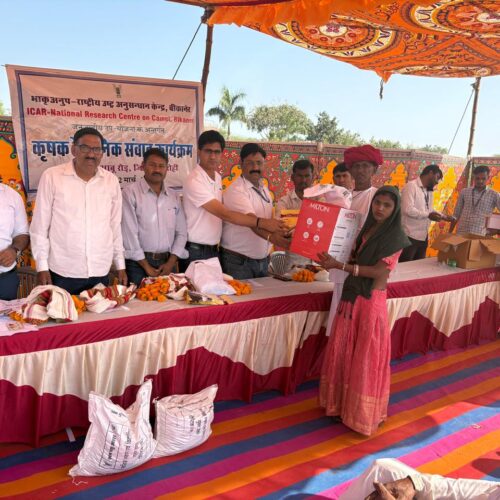

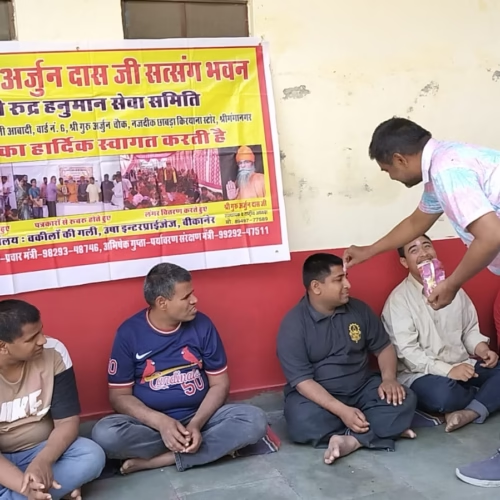
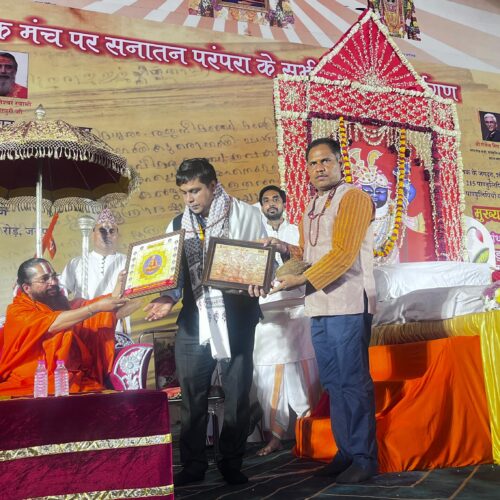
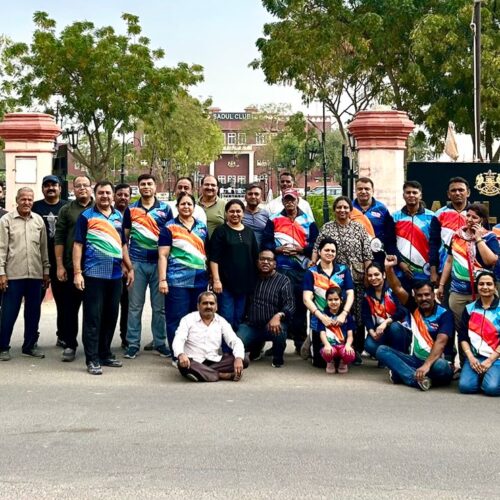
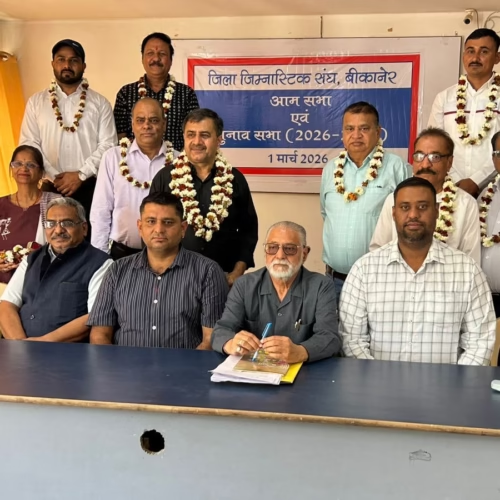

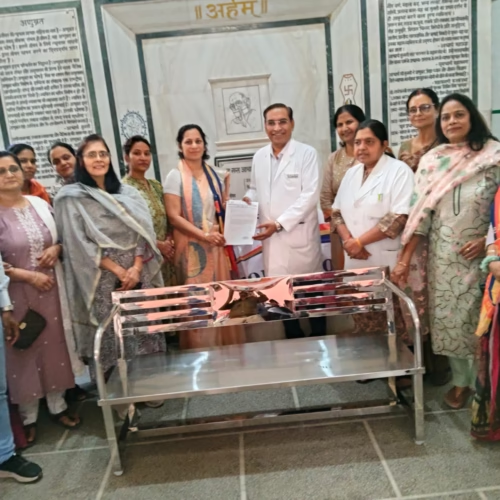
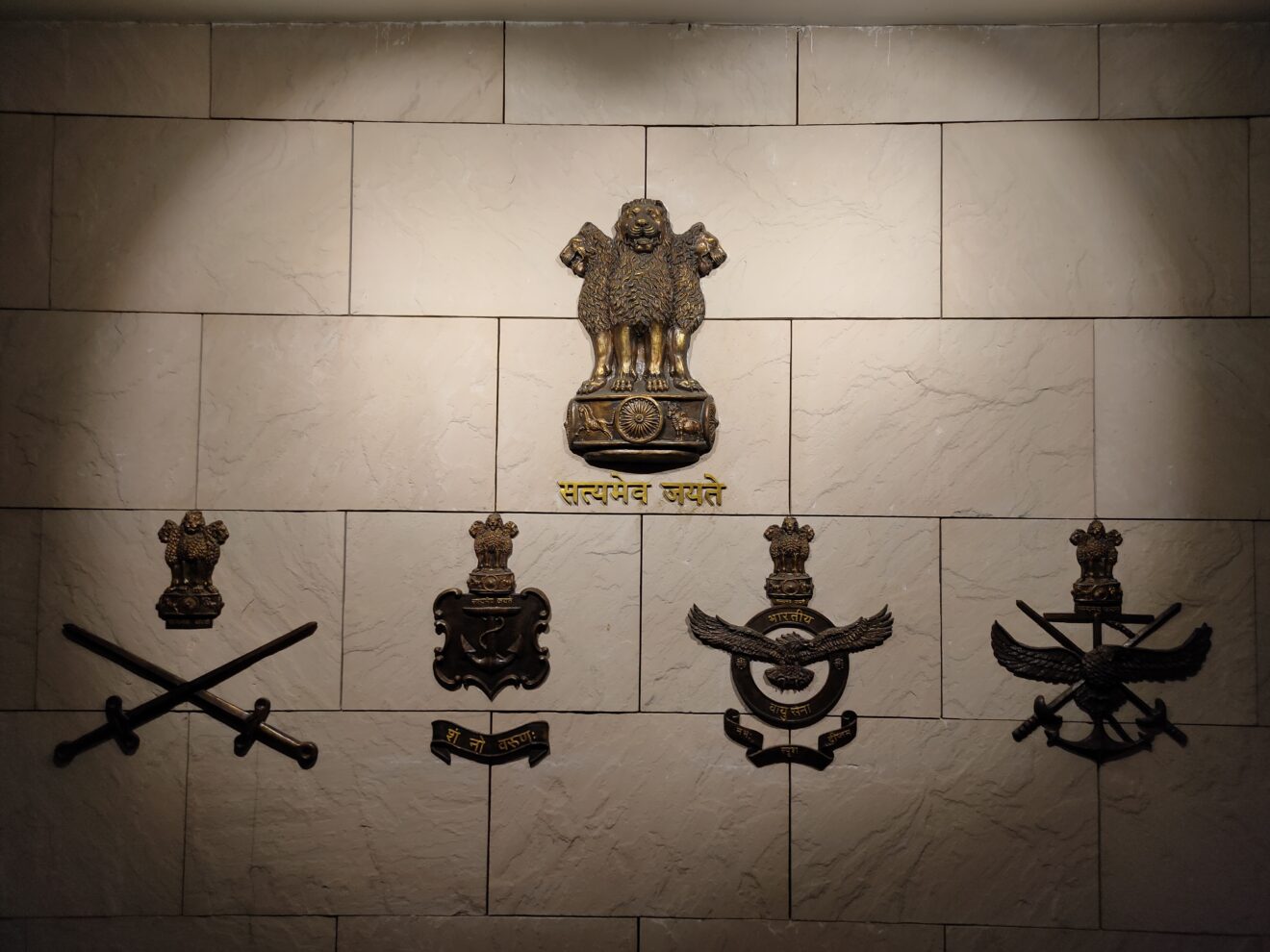




Add Comment